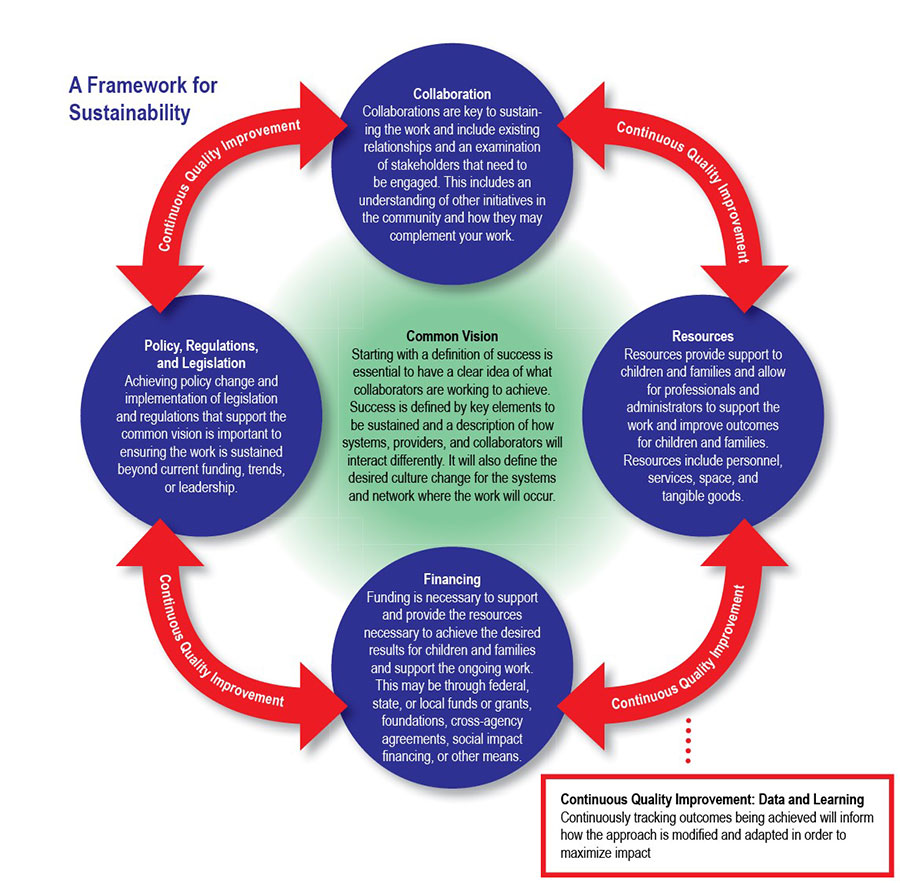Infant-Toddler Court Program
The Infant-Toddler Court Program helps systems better serve their constituents by implementing infant-toddler court teams, which are based on the Safe Babies Court Teams (SBCT) approach. These court teams are focused on serving infants, toddlers, and their families and are made up of stakeholders within child welfare, the judiciary, and community-based organizations.
The SBCT approach hinges creating partnerships and collaborative efforts across all facets of this work. Through strong collaboration, stakeholders intervening with infants and toddlers in child welfare have the opportunity to learn from one another about the impact that can be made through adopting a developmental approach to understanding families’ trauma, healing, and recovery. Supporting all stakeholders in the co-creation of a court model that is informed by early childhood development, grounded in research, and tailored to meet the needs and values of their community—whether local or statewide—can help sustain the tenure of an infant-toddler court team approach.
Through expertise and strong collaboration, the Infant-Toddler Court Program promotes the demonstration projects; allows for collaborative resolution of systemic barriers; and encourages continuous input on key activities related to supporting a child and their family. The work is grounded in child welfare systems but requires investments and collaboration at the community and policy level.
The Infant-Toddler Court Team Program works in 12 local jurisdictions and states to help them better meet the needs of young children and their families involved with the child welfare system.
The Infant-Toddler Court Team Program is funded by the United States Administration on Children, Youth and Families, Children’s Bureau and is operated by ZERO TO THREE and its partners, (CSSP, the National Council of Juvenile and Family Court Judges, and RTI International).
Infant-Toddler Court Program Outcomes
Evaluations conducted by RTI International have shown that children involved with the infant-toddler court teams have better placement stability, shorter lengths of stay in foster care, and better access to early intervention screenings compared to the national data.
Infant-Toddler Court Program Partners
Infant-Toddler Court Program Sites
- New Haven and Milford Infant-Toddler Court Teams, Connecticut
- Florida Early Childhood Court, State of Florida (including Pinellas County, E. Pasco County, S. Okaloosa County, Bay County, and Hillsborough County)
- Hawaii Zero to Three Court, Honolulu, Hawaii
- Polk County Safe Babies Court Team, Des Moines, Iowa
- Forrest County and Rankin County Safe Babies Court Teams, Mississippi
- Eastern Band of Cherokee Indians, The Cherokee Safe Babies Program, Cherokee, North Carolina
Infant-Toddler Court Program Resources
Grounding Family and Child Well-Being Policies and Systems in Anti-Racist Principles and Strategies. The Center for the Study of Social Policy and the National Infant-Toddler Court Program (ITCP) at ZERO TO THREE released this brief to highlight principles and strategies that if implemented with an intentional focus on advancing equity and responding to communities, can support infant and toddler well-being and strengthen families with young children, consequently, preventing involvement in child welfare and other deep-end systems.
Advancing Equitable Outcomes for Infants and Toddlers Involved in Child Welfare. The goal of focusing on equity in child welfare is to help infant–toddler court teams ensure all eligible families are being given the opportunity and access to services that will help their children thrive. This brief suggests a process, tool, and various strategies to help teams focus on advancing equity, building on the work documented in the Safe Babies Court Team™ approach to provide context and direction for ongoing action. In addition, an accompanying fact sheet provides information on implicit bias and historical, structural, and institutional racism—all of which have a direct impact on children of color who are involved with child welfare and other public systems.
Preparing A Funding Ask: Four Easy Steps. This resource provides support for sites seeking funding to sustain an aspect of a team based on the Safe Babies Court Team approach. Specifically, this document outlines a simple process to follow and provides a series of questions to answer to prepare for making a funding ask.
Child Welfare: Building, Developing, and Leveraging Collaborations. The second in a series of sustainability briefs from the Infant-Toddler Court Program, this brief focuses on the importance of collaboration in sustaining practice change. Each of the Infant-Toddler Court Program sites has developed and is continuing to create new collaborations to implement and sustain the SBCT approach in their local communities, which are highlighted in case studies throughout this brief.
Sustaining New Approaches in Child Welfare: A Framework for Sustainability for Research-Based Infant-Toddler Court Teams. The first in a series of sustainability briefs from the Infant-Toddler Court Program, this brief lays out a framework for sustainability and the key elements necessary to understand and leverage in order to sustain—and institutionalize—a new approach, practice, and/or delivery model. While each site faces unique opportunities and challenges that impact their strategies for sustaining the work, the guiding questions in this brief are intended to help frame local thinking and sustainability planning.
Sustainability of the Infant-Toddler Court Teams





